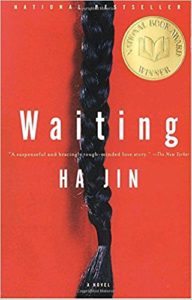 If you appreciate Chinese culture and the wrenching changes it endured in the twentieth century, this book has more meaning and significance. At face value, the story is about a country doctor working in the army who has an arranged marriage with an unattractive, illiterate woman he doesn’t care for. Nevertheless, she bears him a daughter, cares for the child and the household and serves him without complaint for decades.
If you appreciate Chinese culture and the wrenching changes it endured in the twentieth century, this book has more meaning and significance. At face value, the story is about a country doctor working in the army who has an arranged marriage with an unattractive, illiterate woman he doesn’t care for. Nevertheless, she bears him a daughter, cares for the child and the household and serves him without complaint for decades.
Away in the army, he falls in love with a young nurse but their relationship is forbidden by law and tradition so they skulk around for 300 pages. The doctor vows to divorce his wife, but predictably fails to do so. The lovers are frustrated, waiting 18 years for the right circumstances for him to get a divorce so they can marry.
The doctor’s country wife represents the traditional rural ways and values, where people eke a difficult living not far removed from the life of the animals they tend. The doctor is at least educated and curious. He has a library of forbidden Russian classic novels and he ponders questions of fate and destiny and is frustrated by traditional ways, but helpless to act. He is an almost-modern man and represents the “new” China – not the sophisticated China we know today, but the emergence of the modern mind in the latter half of the century, after the Cultural Revolution. The story takes place from the 1960’s to the 1980’s.
The doctor is an individual. He has an ego. He has personal desires and feels he has a right to satisfy those desires but is constrained by a personal morality. He is a modern man in that sense. But he respects tradition and waits eighteen agonizing years of close separation from his lover until he can finally have her, and those were the best years of his life he discovers when it is too late. Just like millions of people who endured the transition from premodern to modern China, the doctor waited for life to happen and then found it had passed him by.
The reader almost feels as if his own life is passing him by as he reads chapter after repetitive chapter about the doctor going to the judge for a divorce every year then backing off when his wife refuses to agree. We spend hours, afternoons, days, weeks and years admiring the landscape and preparing and eating the seasonal foods. That tedium does convey the actual pace of rural life, the way a Bela Tarr movie does, but as a modern man myself, I would have appreciated some conceptualization and time compression.
In the end, I think the story is more sentimental than compelling. The flaw is that modern individualism grows out of a certain kind of culture. It does not sprout like a weed for no reason, and Doctor Lin did not live in a culture that would support and nurture the world view of a modern person. So in the end, when he reflects on why one is “not allowed to have what your heart was destined to embrace,” I found the sentiment flat.
He was supposed to be a man with one foot in the past and the other in the changing present, but all we saw was the past. We did not see the modernization of China, in politics, literature, movies, banking, industry, architecture, or international relations. Unlike in Dr. Zhivago, only the faintest hints of those great changes are glimpsed, so in the end, Doctor Lin is a cipher.
Still, for those with patience and interest in experiencing rural Chinese life in a bygone era, reading this National Book Award winner is like reading history, much as reading Stendhal and Flaubert will give you a sense of nineteenth century France.
Jin, Ha (1999). Waiting. New York: Random-Pantheon (308 pp).
